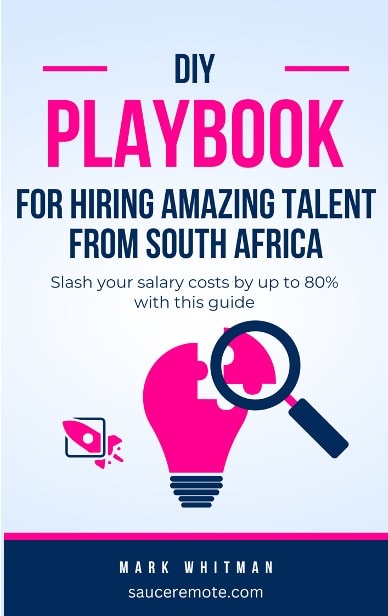Considering adding some talented Filipino professionals to your team? Great choice!
The Philippines is known for its vibrant workforce, exceptional English proficiency, and diverse skill set, making it an excellent location for global business expansion.
But how do you navigate the intricacies of Philippine labour laws, taxes, and local customs?
That's where an Employer of Record (EOR) in the Philippines comes in.
In this article, we'll explore how partnering with an EOR in the Philippines can make your recruitment smooth, compliant, and straightforward.
Ready? Let’s roll.

Discover how to slash your salary costs by 80%
Get our exact process for hiring amazing overseas talent from South Africa. Includes copy-and-paste templates and a detailed salary guide.
What Is an Employer of Record in the Philippines?
An Employer of Record in the Philippines is a third-party service provider that legally employs workers on your behalf and handles all local HR, payroll, and legal compliance.
In a nutshell, the EOR becomes the official employer for your Philippine hires, managing compliance and administrative tasks while you focus on leading your team to success.
My pro tip: Still trying to figure out what an EOR does? Check out my guide on What Does EOR Stand For to learn the basics.
Why do companies choose an EOR instead of hiring directly in the Philippines?
Here are the key reasons:
- Efficient Market Entry: Skip the lengthy process of setting up a legal entity in the Philippines.
- Regulatory Compliance: Ensure compliance with local employment laws, which can be complex for outsiders.
- Cost Savings: Avoid the overhead and hassle of establishing and maintaining a local entity.
In short, an EOR lets you tap into the skilled Filipino workforce quickly and compliantly without the usual red tape.
But what makes the Philippine labour market appealing, and how does an EOR make the process easier?
Let's dive a little deeper.
Hire remote talent from South Africa & slash salary costs by 80%
Salaries start from £8,000 per year!
Understanding the Philippine Employment Landscape
When I first considered hiring in the Philippines, I was struck by how dedicated and hardworking the workforce is.
But like any country, the local regulations can be tricky to navigate if you’re unfamiliar with them.
Here’s what you need to know:
Standard Working Hours and Overtime
In the Philippines, the standard workweek is 48 hours, typically 8 hours a day, six days a week.
As for overtime, employees are entitled to additional pay for hours worked beyond 8 hours per day.
The overtime rate is usually 125% of the regular pay rate, with higher rates for holidays and rest days.
Compensation and Currency
The local currency is the Philippine Peso (PHP).
The Philippines has a mandated minimum wage, which varies by region.
For example, the minimum wage in Metro Manila is currently around PHP 610 per day, though this may vary depending on specific industry rules and regional guidelines.
Some other standard compensation practices include:
- 13th Month Pay: This is mandatory in the Philippines. Employers must provide employees with an additional month’s salary before December 24th each year.
- Bonuses and Benefits: Many employers also offer performance bonuses, health benefits, and allowances for transportation or meals.
Let’s look at public holidays and annual leave in the Philippines.
Hire remote talent from South Africa & slash salary costs by 80%
Salaries start from £8,000 per year!
Public Holidays and Annual Leave
The Philippines observes numerous public holidays—often called "regular holidays" and "special non-working days."
There are typically around 18 holidays per year, including:
- New Year's Day
- Holy Week (Maundy Thursday and Good Friday)
- Independence Day
- Christmas Day
- Rizal Day
Beyond the public holidays, employees are also entitled to annual leave.
Employees who have worked for at least one year are entitled to five days of service incentive leave, which can be used for vacation or sick leave.
However, many companies provide more generous leave policies as part of their benefits package.
Tax Obligations and Social Contributions
Understanding the tax system is crucial for compliance:
- Income Tax: Employers must withhold income tax from employees’ salaries based on progressive tax rates ranging from 0% to 35%.
- Social Security System (SSS), PhilHealth, and Pag-IBIG: Employers must contribute to these social programs, which provide benefits like healthcare, housing loans, and pensions. Contributions are shared between employer and employee.
So, what about leave policies and parental benefits in the Philippines?
Hire remote talent from South Africa & slash salary costs by 80%
Salaries start from £8,000 per year!
Leave Policies and Parental Benefits
Here’s what you should know about employee entitlements in the Philippines:
- Maternity Leave: Female employees are entitled to 105 days of paid maternity leave, with an option to extend for 30 days without pay.
- Paternity Leave: Fathers are entitled to 7 days of paid paternity leave.
- Solo Parent Leave: Solo parents can avail of an additional 7 days of annual leave.
Probation Period and Termination
When hiring in the Philippines, it's common to start with a probationary period:
- Probation Period: Typically lasts up to 6 months. During this time, either party can terminate the employment with minimal notice.
- Termination Notice: After regularisation, employers must provide 30 days' notice for termination, and there must be a valid reason, such as just cause or authorised cause, as defined by the Labour Code.
Navigating these regulations can be challenging, especially for companies unfamiliar with the local laws.
This is where partnering with an Employer of Record in the Philippines becomes incredibly valuable. They handle compliance, so you don’t have to.
Hire remote talent from South Africa & slash salary costs by 80%
Salaries start from £8,000 per year!
How to Choose the Best EOR in the Philippines
Selecting the right Employer of Record in the Philippines is key to a successful recruitment strategy. Here are some factors to consider:
Expertise in Philippine Employment Laws
Ensure your EOR has deep knowledge of local labour laws, contracts, and business customs.
This expertise helps you avoid legal pitfalls and ensures your employment practices are fully compliant, saving you from costly fines and disruptions.
Comprehensive Service Offering
Look for an EOR that handles payroll, HR support, tax administration, and benefits management.
This all-in-one service streamlines your operations, reducing the need to juggle multiple vendors and ensuring a seamless experience for both you and your employees.
Transparent Pricing Structure
Request a detailed breakdown of fees to avoid any surprises later. Clear pricing helps you budget effectively and eliminates unexpected costs, giving you confidence in your financial planning.
Tailored Solutions
Your EOR should offer flexibility to meet your specific needs, whether you’re a startup or a large enterprise.
Custom solutions ensure that you get support that scales with your business, making your expansion smoother and more efficient.
Proven Track Record
Check client testimonials and case studies to ensure they have a strong history in the Philippines.
A proven track record gives you peace of mind, knowing that the EOR has successfully helped other companies navigate similar challenges.
Local Presence with Global Reach
An EOR with a solid local team can offer cultural insights and provide prompt support when issues arise.
Local presence means faster response times and a better understanding of the nuances that can impact your business success.
But what if this sounds tricky? I have a solution.
Hire remote talent from South Africa & slash salary costs by 80%
Salaries start from £8,000 per year!
Exploring Alternative Labour Markets
While the Philippines offers a highly skilled, English-speaking workforce, you may also want to explore other markets, such as South Africa.
South Africa offers a young, native English-speaking workforce familiar with Western culture.
If you're interested in hiring South African employees, partnering with an Employer of Record in South Africa is the key.
Final Thoughts
And there you have it: Hiring in the Philippines doesn’t have to be complicated.
By partnering with a reliable Employer of Record, you can easily navigate the local employment landscape and focus on what really matters—growing your business.
Let your EOR handle the paperwork and compliance while you focus on building an amazing team.
